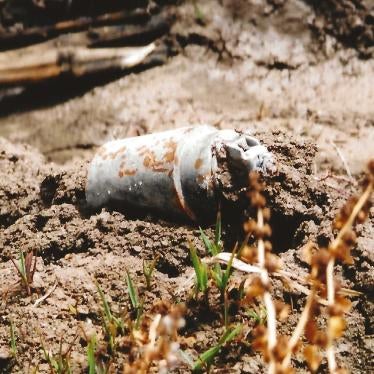Thank you for the floor Madam President.
Human Rights Watch is a co-founder of the Campaign to Stop Killer Robots, and my colleague Mary Wareham is the Global Coordinator of the Campaign.
Madam President, I believe that five years ago at the Fourth Review Conference, not a single government or single NGO spoke of Lethal Autonomous Weapons Systems, or killer robots, or autonomous weapons in any form. So we have come a long way. We have made tremendous progress outside the CCW and significant progress inside the CCW. We give our thanks and appreciation to Amb. Simon-Michel and Amb. Biontino for guiding that progress in the CCW.
This morning the UN Secretary-General said we are at a critical juncture. Indeed, we are at a critical juncture on many fronts, but we are certainly at a critical juncture on the CCW and Lethal Autonomous Weapons Systems.
This Review Conference will determine if the CCW is serious about making progress on Lethal Autonomous Weapons Systems, or if it is simply in a holding pattern while such technologies and weapons are being rapidly developed and are soon to be fielded.
In our view, the only credible outcome for the Review Conference is the establishment of an open-ended Group of Governmental Experts (GGE) on Lethal Autonomous Weapons Systems, moving the discussions to formal status and creating the expectation of a concrete outcome.
To be credible, High Contracting Parties should commit to three to four weeks of work on Lethal Autonomous Weapons Systems in 2017. Any less will likely doom the talks to unsatisfactory progress.
In addition, High Contracting Parties should adopt a much more ambitious mandate than merely developing “options.” High Contracting Parties should establish the GGE with the expectation that it will lead to formal negotiations, as has been the case for other CCW GGEs.
And we believe, as do a growing number of High Contracting Parties (thanks to Argentina, Panama, and Peru for joining the list today!), that the negotiations should lead to a new Protocol VI that preemptively bans the development, production, and use of Lethal Autonomous Weapons Systems.
A second priority for the Review Conference should be incendiary weapons. Simply put, Protocol III has not worked well enough. Too many civilians are still dying and being horribly injured and disfigured by these weapons. Human Rights Watch has reported on the greatly increased and regularized use of incendiary weapons in Syria. We have a new memorandum to CCW delegates on this and other aspects of the issue, and we will have a side event on this tomorrow morning.
We appreciate the many expressions of concern this morning and in the past few years regarding recent use of incendiary weapons. But it is time to move beyond statements of concern about and even condemnation of ongoing use.
High Contracting Parties need to put incendiary weapons on the CCW agenda for work in the coming years. This Review Conference is the last, best chance to do so. And a growing number of High Contracting Parties have called for this.
We urge High Contracting Parties to set aside time for discussions in 2017 on the effectiveness and adequacy of Protocol III, with a view to amending and strengthening the Protocol in the near future. At a minimum the loophole for use of surface-delivered incendiary weapons in populated areas should be closed, and an effects-based definition should be adopted. The best solution would be a comprehensive prohibition.
Madam President, in closing, I would like to note that Human Rights Watch supports the call for better monitoring of technological developments in laser systems, in order to ensure full compliance with the letter and spirit of Protocol IV banning blinder lasers.
Thank you.






